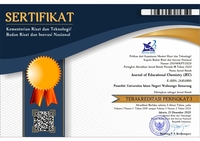The Implementation of Education for Sustainable Development-Oriented Problem-Based Learning in Practical Work for Making Alum
DOI:
https://doi.org/10.21580/jec.2022.4.2.13500Keywords:
problem based learning, education for sustainable development, practical workAbstract
The problem-based learning (PBL) method is one method to insert the competency targets of Education for Sustainable Development (ESD). This research aims to investigate how the implementation of ESD-oriented problem-based learning to metal and non-metal chemistry practical work. The research method used in this research is a qualitative descriptive method and the research subject is the 4th-semester Chemistry Education university students. The research result shows that the ESD-oriented PBL method is applicable in metal and non-metal chemistry practical work. Practical work with the ESD-oriented PBL method can be used as an innovation for practical learning activities to achieve the ESD target competencies. Based on the questionnaires responded by the students, it can be concluded that the practical work with the ESD-oriented PBL method could increase the students’ ability for problem-solving with percentages of 33% strongly agree and 50% agree. Practical work learning with the ESD-oriented PBL affects the students to be more active in practical work activities. The stages of the PBL method help the students develop problem-solving abilities, and this is one target of ESD competencies.
Downloads
References
Abanikannda, M. O. 2016. Influence of Problem-Based Learning in Chemistry on Academic Achievement of High School Students In Osun State, Nigeria. International Journal of Education, Learning and Development, 4(3), 55–63.
Abdurrozak, R., Jayadinata, A. K., & Isrok’atun. 2016. Pengaruh Model Problem Based Learning terhadap Kemampuan Berpikir Kreatif Siswa. Jurnal Pena Ilmiah, 1(1), 871–880.
Adeyemi, S. B. 2012. Developing Critical Thinking Skills in Student : A Mandate for Higher Education. European Journal of Educational Research, 1(2), 155–161.
Aisy, M. R., & Gunansyah, G. 2020. Praktik Education Sustainable Development: Studi Komparasi di Sekolah Dasar Kota Surabaya. Jurnal Penelitian Pendidikan Guru Sekolah Dasar, 8(2), 1–11.
Al-Fikry, I., Yusrizal, Y., & Syukri, M. 2018. Pengaruh Model Problem Based Learning Terhadap Kemampuan Berpikir Kritis Peserta Didik pada Materi Kalor. Jurnal Pendidikan Sains Indonesia, 6(1), 17–23.
Alimirzaloo, E., & Hashemnezhad, H. 2016. An Investigation on the Relationship Between Critical Thinking Skills, Language Learning Strategies, and Thinking Styles of Iranian EFL Learners. International Journal of Research Studies in Language Learning, 5(2), 57–74.
Arends, R. I. 2008. Learning to Teach. terj. Helly Prajitno Soetjipto dan Sri Mulyantini Soetjipto. Yogyakarta: Pustaka Pelajar.
Desriyanti, R. D., & Lazulva, L. 2016. Penerapan Problem Based Learning pada Pembelajaran Konsep Hidrolisis Garam untuk Meningkatkan Hasil Belajar Siswa. JTK (Jurnal Tadris Kimiya), 1(2), 70–78.
Ghany, H. 2018. Penyelenggaraan Pendidikan untuk Pembangunan Berkelanjutan di Sekolah Dasar. Jurnal Madaniyah, 8(2), 189–202.
Kristiana, T. F., & Radia, E. H. 2021. Meta Analisis Penerapan Model Problem Based Learning dalam Meningkatkan Hasil Belajar IPA Siswa Sekolah Dasar. Jurnal Basicedu, 5(2), 818–826.
Langitasari, I., Rogayah, T., & Solfarina, S. 2021. Problem Based Learning (Pbl) Pada Topik Struktur Atom: Keaktifan, Kreativitas dan Prestasi Belajar Siswa. Jurnal Inovasi Pendidikan Kimia, 15(2), 2813–2823.
Laurie, R., Tarumi, Y. N., Mckeown, R., & Hopkins, C. 2016. Contributions of Education for Sustainable Development (ESD) to Quality Education: A Synthesis of Research. Journal of Education for Sustainable Development, 10(2), 226–242.
Listiawati, N. 2013. The Implementation of Education for Sustainable Development by Several Agencies. Jurnal Pendidikan dan Kebudayaan, 19(3), 430–450.
Nuryanto, N., Utami, B., & Saputro, A. N. C. 2015. Penerapan Model Pembelajaran Problem Based Learning (PBL) Dilengkapi Macromedia Flash untuk Meningkatkan Kemampuan Berpikir Kritis dan Prestasi Belajar Siswa SMA Negeri 2 Karanganyar Tahun Pelajaran 2014/2015. Jurnal Pendidikan Kimia (JPK), 4(4), 87–94.
Pratiwi, I. I., Wijaya, A. F. C., & Ramalis, T. R. 2019. Penerapan PBL Dengan Konteks ESD Untuk Meningkatkan Hasil Belajar Kognitif Peserta Didik. Prosiding Seminar Nasional Fisika (E-Journal), 8, SNF2019-PE. https://doi.org/10.21009/03.SNF2019.01.PE.01
Priyani, Y., Tri Martuti, N. K., & Rudyatmi, E. 2019. Penerapan Problem Based Learning Berpendekatan Saintifik dalam Meningkatkan Kemampuan Berpikir Kreatif Siswa Materi Perubahan Lingkungan. Bioma: Jurnal Ilmiah Biologi, 8(1), 337–350.
Pusparini, S. T., Feronika, T., & Sapinatul Bahriah, E. 2018. Pengaruh Model Pembelajaran Problem Based Learning (PBL) Terhadap Kemampuan Berpikir Kritis Siswa pada Materi Sistem Koloid. Jurnal Riset Pendidikan Kimia, 8(1), 35–42.
Segara, N. B. 2015. Education for Sustainable Development (ESD) Sebuah Upaya Mewujudkan Kelestarian Lingkungan. SOSIO DIDAKTIKA: Social Science Education Journal, 2(1), 22–30.
Syaribuddin, S., Khaldun, I., & Musri, M. 2016. Penerapan Model Pembelajaran Problem Based Learning (PBL) dengan Media Audio Visual pada Materi Ikatan Kimia Terhadap Penguasaan Konsep dan Berpikir Kritis Peserta Didik SMA Negeri 1 Panga. Jurnal Pendidikan Sains Indonesia, 4(2), 96–105.
UNESCO. 2020. Sub-Education Policy Review Report: Education for Sustainable Development. In UNESCO, Paris France. 25 Juni 2022. https://unesdoc.unesco.org/ark:/48223/pf0000374802
Downloads
Published
How to Cite
Issue
Section
License
The copyright of the received article shall be assigned to the journal as the publisher of the journal. The intended copyright includes the right to publish the article in various forms (including reprints). The journal maintains the publishing rights to the published articles.
Authors are permitted to disseminate published articles by sharing the link/DOI of the article at the journal. Authors are allowed to use their articles for any legal purposes deemed necessary without written permission from the journal with an acknowledgment of initial publication to this journal.

This work is licensed under a Creative Commons Attribution-NonCommercial-ShareAlike 4.0 International License.


